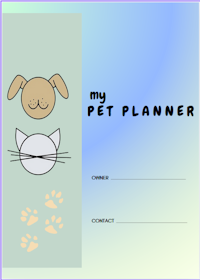Corgi Dogs
Herding Dogs Of Substance!
There are two types of Corgi dogs from Wales in England. One is the Pembroke named for the county of Pembrokeshire and the other is the Cardigan from the county of Cardiganshire, also known as Ceredigion.
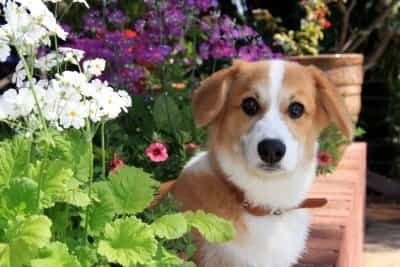
History of the Pembroke
The history of the Pembroke Welsh Corgi, often referred to as the Pem,
can be traced back to early records in the years 920-1107 AD. It is
thought that they were brought to Britain around this time period by
Flemish weavers who settled in the area of Pembrokeshire.
The Corgi dogs are the shortest of the herding dogs, but this low
stature, combined with their quick agility, enabled them to excel in their
original job of herding various cattle, as well as horses. In some
areas they are still used as working dogs.
Although breeders at one time routinely interbred the Pembroke with the
Cardigan Corgi, this practice was discontinued in 1934. This same year
they were recognized by the English and American kennel clubs as
distinct breeds with noticeable differences.
Corgi Dogs - The Differences
Some of these differences between the two Corgi dogs are rather subtle and may not be noticed by the untrained eye. But upon close inspection one can see that the Pembroke has slightly pointed ears while his counterpart has ears that look more rounded at the top.
In addition, the Pembroke has a docked or very short tail, while the Cardigan's is long and brush-like. Other less noticeable differences of the Pembroke are:
- his height - slightly shorter
- facial expression - more fox-like, and
- demeanor - more excitable.
Ancestors of the breed include the Schipperke, Pomeranian, Keeshond, Samoyed, Norwegian Elkhound, Chow-Chow, and Finnish Spitz.
There is some speculation that there may also be an ancestral link
between the Pembroke Corgi and the Swedish Vallhund, due to their physical
similarities. However, if there is a relationship, it is unclear which
one of these two dog breeds may have contributed to the development of
the other!
The Pembroke Welsh Corgi has a long history as a favored pet among
royalty. Queen Elizabeth II, is especially fond of the breed and keeps
several of them in the royal residences.
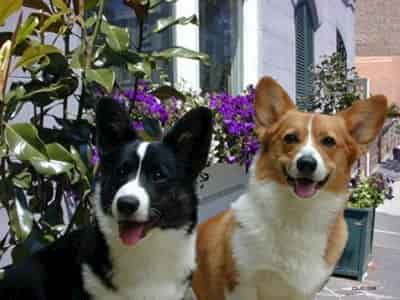 Source: Wikimedia
Source: WikimediaCardigan Welsh Corgi History
This Corgi dog, affectionately called the Cardi, is the older of the two
breeds and has been around for such a long time that dog fanciers
cannot agree just exactly how long.
Many have the belief that this dog arrived in Britain with the Celts
3000 years ago, while others maintain it came calling just 1000 years
ago, which is still considerable in anyone's book!
The Cardi, once called the "yard long dog," sports a long fox-like tail,
is very low set in his physical structure and is long in proportion to
his height. But, his shortness poses no impediment to his natural job of
herding, for which he is adequately endowed.
Strong bones and muscles enable him to perform his tasks with a high level of speed and dexterity.
The Cardigan's lineage is associated with the Teckel family of dogs, which also produced the Dachshund.
At one point they were crossed with Collies for the addition of
colors.
The Cardigan was designated a separate breed from its counterpart, the Pembroke
Corgi, during the 1930's. The Pembroke is the smaller of the two and and is easily identified by its lack of a tail.
The Cardigan has been recognized for his abilities in herding, tracking, agility and obedience.
Traits of the Pembroke Corgi Dog

Owners of the Pembroke Welsh Corgi will readily attest that he is a vivacious and charming
dog. Regarded as being highly intelligent, cooperative and quick to learn, he makes training
him more of a pleasure than a duty.
As a family companion he is loving, devoted and naturally
protective. To balance out any over-protectiveness, he should be well-socialized as a puppy.
While he makes a good watchdog, he is not a nuisance barker.
Pembroke corgi dogs are very active, enjoy playing any kind of game and want to be included in every family activity..
If competitive dog activities are of interest, the Pembroke loves to learn and does well in
tracking, herding and obedience.
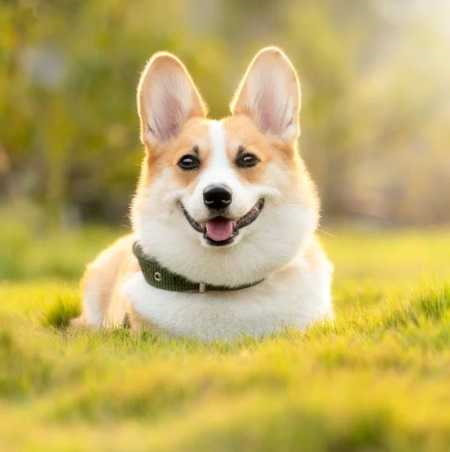
Traits of the Cardigan Corgi
The Cardigan Welsh Corgi is very loyal and loving as a family companion. He is a calm dog, reserved with strangers and naturally protective, making him excellent as a watch dog.
Though not aggressive, if the necessity arises, he will defend his master to the point of risking his own life.
Corgi dogs are intelligent quick learners and can be trained for obedience and agility. Some Cardis have retained fairly strong herding instincts which can resurface even in a family setting, to the point of nipping someone's heels.
This is a behavior that can easily be corrected
with consistent gentle training.
They love to do a job and are good at learning commands, so if an owner
wants his slippers fetched, a Cardi will rise to the occasion with
pleasure.
Appearance and Care of the Pem
Height: 10-12 inches or more
Ideal standard weight: 30 pounds or less
Colorwise they can be seen in Red, sable, fawn, black and tan with or without white markings.
White is acceptable on legs, chest, neck, muzzle, undercarriage and on head.
The Pembroke Corgi dog has an over-all medium length coat, comprising a
coarse outer coat and a weatherproof undercoat that is short and thick.
Daily brushing and combing is necessary to keep the coat in good order.
This dog is a heavy shedder year-round and more so at seasonal times
when it can be quite substantial. During this time the coat needs more
frequent attention to avoid fur piling up around the house.
The FURminator is a big help for handling the shedding.
Pembrokes, are known for more sensitivity in having their paws and nails
handled, so it is a good idea to gradually accustom them to accept this
as part of the grooming process.
An automatic nail trimmer is also a good tool for reducing the stress related to this necessary task.
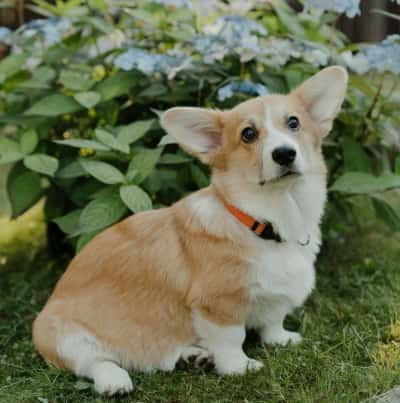 Courtesy Pexels
Courtesy Pexels
Welsh Cardi Vital Stats
Height: 10-12-1/2 inches
Ideal standard weight: female 25 - male 38 lbs.
Coat colors can be seen in various shades of red, sable, brindle, black
with possible tan brindle, or blue merle with possible tan brindle. All
may have white markings, though these should not predominate.
Cardi Coat Care
The Cardi has a weatherproof heavy double coat, the outer coat being of medium length and
harsh, while the undercoat is soft and thick.
Like his counterpart, the Pem, ongoing shedding is to be expected with
even more fallout occurring seasonally twice a year. Regular
maintenance is a must with a frequent brushing and combing routine.
For times of heavier shedding a FURminator DeShedding Tool
is your friend, as it is with both Corgi dogs.
Health Issues That May Affect Corgi Dogs
One of the best ways to help both Corgi breeds have a healthy life is to
keep a close watch on their diet and weight. Left to their own devices
they can become
overeaters and as is well-known, obesity in pets as well as humans is a
serious health threat.
That being said, there are some specific conditions associated with Corgi dogs to be aware of.
- One important one which can cause paralysis is intervertebral disc disease (known in humans as slipped disc). This disease is associated with breeds that have a long torso such as Corgis or Dachshunds.
- Degenerative joint disease commonly referred to as hip dysplasia. One later stage of this disease usually seen in older dogs is osteoarthritis.
- A condition affecting the spinal cord tissues in the lower back area, known as degenerative myelopathy. It has no cure and progresses to paralysis.
- Eye conditions include two that can cause blindness: Progressive Retinal Atrophy, and Retinal Dysplasia.
- A blood clotting disorder which is inherited is vonWillebrands Disease.
While these potential health issues may sound scary, with good care and
regular veterinary oversight, the Corgi can live a healthy life and be
enjoyed for 11-13 years.
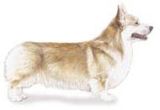
How Active Are Corgis?
The Pembroke and the Cardi are both energetic Corgi dogs! While they may
run off some of their around the house, they still need to get out for
several daily walks.
Since they are also athletic, agile and very trainable, owners may want
to direct their energy into a fun workout with one of these popular Ball Launchers.
Corgis are often seen participating in Agility, Herding and Obedience events at official dog shows.
A fenced outside play area is an ideal outlet to let them enjoy games and run freely.
It bears remembering that if a dog from the herding group does not get
sufficient activity, he will think of other ways to stay busy - some of
which may not be to your liking!
Corgi Dogs Are Not Space Challenged, but ...
Corgi dogs are adaptable to their environment be it a house, condo or apartment, as long as they are allowed to
move about indoors and given other opportunities for plenty of exercise.
Obviously a house with fenced yard space is always going to be the first
choice for a dog that has a background of activity in his genes.
Running freely and playing games gives them the additional mental
exercise these smart dogs need.
Are Corgi Dogs Suitable For Children?
The Pembroke and the Cardigan Corgi do well with children and are patient with them. They love joining in activity and games
and make loving companions.
However, they are a better match for older considerate children that have respect for pets and know how to treat them.
Keep in mind that Corgis have a heritage of herding livestock using
nipping tactics and they like to be in charge - as do some children!
No matter what age a child may be, or what breed of dog, it is our recommendation that an adult always closely supervises activities between pets and children.
Corgis With Seniors Or Less Active Families?
Adaptable, devoted, loyal, protective and loving - this dog's traits make it a fine companion to the elderly.
Corgi dogs will do fine with seniors or in other sedentary environments
providing sufficient exercise can be provided along with the
time to take care of the necessary grooming.
This delightful dog has brought joy to many people in therapy situations.
Fastidious families may not like to deal with the shedding of this breed.


